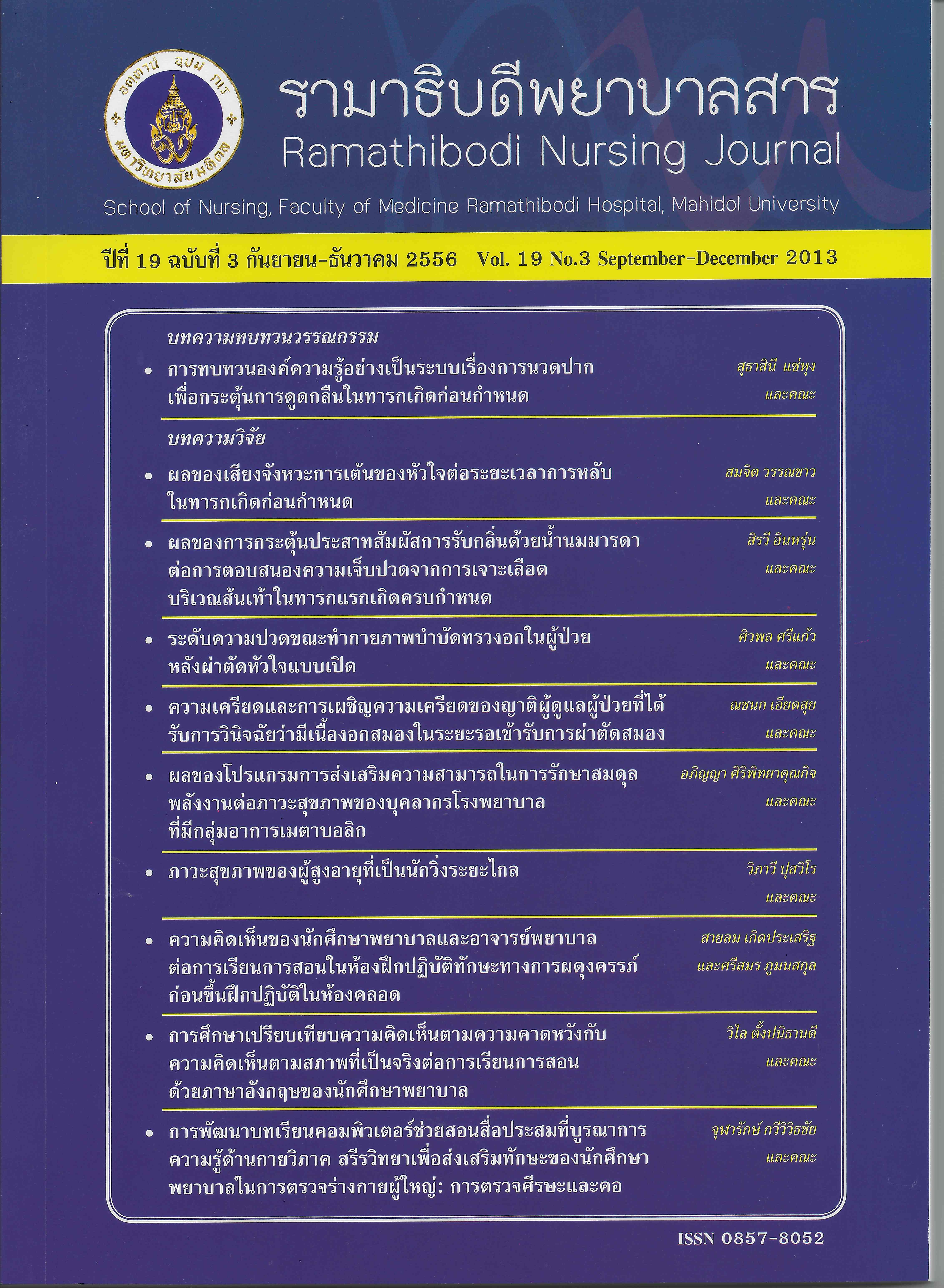ผลของเสียงจังหวะการเต้นของหัวใจต่อระยะเวลาการหลับในทารกเกิดก่อนกำหนด
Main Article Content
Abstract
บทคัดย่อ:
การศึกษาครั้งนี้เป็นการศึกษาผลของเสียงจังหวะการเต้นของหัวใจต่อระยะเวลาการหลับในทารกเกิดก่อนกำหนด รูปแบบการวิจัยเป็นแบบข้ามสลับ (cross-over design) เพื่อเปรียบเทียบระยะเวลาการหลับในทารกเกิดก่อนกำหนด ขณะได้รับฟังเสียงจังหวะการเต้นของหัวใจและขณะไม่ได้รับฟังเสียงจังหวะการเต้นของหัวใจ ศึกษาในตัวอย่างกลุ่มเดียวโดยผู้ป่วยทุกรายเป็นกลุ่มควบคุมในตนเอง กลุ่มตัวอย่างคัดเลือกแบบเฉพาะเจาะจง จากทารกที่รักษาตัวอยู่ในหอผู้ป่วยทารกแรกเกิดและคลอดก่อนกำหนด โรงพยาบาลตากสิน ระหว่างเดือนมีนาคม ถึงเดือนมิถุนายน พ.ศ. 2553 จำนวน 12 ราย ทารกแต่ละรายจะได้รับการทดลอง 2 ระยะ โดยได้รับการสุ่มว่าจะเริ่มระยะใดก่อนระหว่างได้รับฟังเสียงจังหวะการเต้นของหัวใจ (ระยะทดลอง) และไม่ได้รับฟังเสียงจังหวะการเต้นของหัวใจ (ระยะควบคุม) โดยจัดทำฉลากขึ้นมาอย่างละเท่าๆ กัน ทั้ง 2 ระยะจะได้รับการจัดสิ่งแวดล้อมให้เหมือนอยู่ในครรภ์มารดา ควบคุมแสงไม่ให้เกิน 600 ลักซ์ ควบคุมเสียงไม่ให้เกิน 58 เดซิเบล ประเมินพฤติกรรมการหลับตื่นของทารกจากวิดีทัศน์ โดยใช้แบบบันทึกการหลับตื่นของทารกเกิดก่อนกำหนด และคู่มือการประเมินพฤติกรรมการหลับตื่นของทารกเกิดก่อนกำหนด วิเคราะห์ข้อมูลทั่วไปโดยใช้ความถี่ ร้อยละ ค่าเฉลี่ย และส่วนเบี่ยงเบนมาตรฐานส่วนข้อมูลการหลับตื่นวิเคราะห์โดยใช้สถิติ Wilcoxon Signed-Rank test และ Paired t-test ผลการวิจัยพบว่า ระยะเวลาการหลับทั้งหมด และระยะเวลาหลับลึกของทารกเกิดก่อนกำหนดขณะที่ได้รับฟังเสียงจังหวะการเต้นของหัวใจ มากกว่าขณะที่ไม่ได้รับฟังเสียงจังหวะการเต้นของหัวใจอย่างมีนัยสำคัญทางสถิติ ผลการศึกษาครั้งนี้ สามารถนำไปใช้เป็นแนวทางในการปฏิบัติเพื่อส่งเสริมการนอนหลับในทารกเกิดก่อนกำหนด
คำสำคัญ: ทารกเกิดก่อนกำหนด ระยะเวลาการหลับ เสียงจังหวะการเต้นของหัวใจ
Abstract:
This study employed a cross-over experimental design for exploring the effects of a heartbeat sound on the sleep duration of preterm infants with the objective of comparing the sleep time of premature infants while both hearing heartbeat sounds and not hearing them. The study was conducted with only one sample group and every patient was in the self-control group. All twelve preterm infants were selected by purposive sampling from the Newborn Unit, Taksin Hospital during March–June, 2010. Each preterm infant was randomly assigned a stage to begin with: i.e. hearing a heartbeat sound (experimental stage) or not hearing a heartbeat sound (control stage) whereby equal amounts of tags (A or B) were made to choose at which stage each of the infants would start. The environments of both stages were arranged similarly to a womb environment, controlling light not to exceed 600 Lux and sound not to exceed 58 dB. The premature infants’ sleep-wake behaviors were evaluated from video recorder by using the infants’ sleep-wake record form and sleep-wake behavior evaluation guideline for preterm infant. General information was analyzed in terms of frequency, percentage, mean, and standard deviation. Sleep-wake information was analyzed by using the Wilcoxon Signed-Rank test and Paired t-test. The findings of the study revealed that the sleep duration and quiet sleep duration of preterm infants while hearing heartbeat sounds were longer than that not hearing heartbeat sounds with statistical significance. The results can be utilized as nursing practice guidelines for promoting the sleep of preterm infants.
Keywords: Preterm infants, Sleep duration, Heartbeat sound
Article Details
บทความ ข้อมูล เนื้อหา รูปภาพ ฯลฯ ที่ได้รับการตีพิมพ์ในรามาธิบดีพยาบาลสาร ถือเป็นลิขสิทธิ์ของวารสาร หากบุคคลหรือหน่วยงานใดต้องการนำทั้งหมดหรือส่วนหนึ่งส่วนใดไปเผยแพร่หรือเพื่อกระทำการใด ใด จะต้องได้รับอนุญาตเป็นลายลักษณ์อักษรจากรามาธิบดีพยาบาลสารก่อนเท่านั้น


